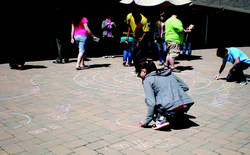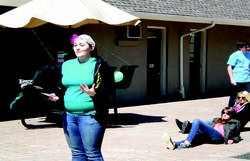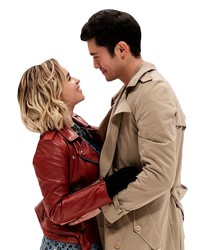“Here, There, Then, Now,” a performance presented by stu-dents as a part of the Global Understanding Convention and the ART NOW: Performance, Art and Technology series, took place on April 5 in the 600 building courtyard. The out-door setting was an appropriate venue for a presentation since it was all about the ocean.
The University has a spe-cial connection with the ocean, and for some, this is its best aspect while others despise it. That is why Pro-fessor Deanna Shoemaker’s Performance and Social Ac-tivism class centered their performance on the sea.
The students were re-quired to write their own short stories about the ocean as well as interview five other individuals about what their feelings were on the ocean.
In the actual performance, students came out chanting
“Here, there, then, now” and recited a Lucille Clifton poem, “The Mississippi River Enters the Gulf.” The poem details how many only think of the present, ignoring all that came before and will come after.
Dahlia Elsayed, professor of Art and Design and one of the individuals behind ART NOW, said, “We all go to the ocean and leave a mark and the waves come and destroy it.”
Afterwards, they all said their short stories about their thoughts on the ocean that in-cluded embarrassing or scary experiences. Some, like junior Henry Siebecker, had epiphanies when it came to discussing the presence of the sea. Siebecker said, “I come out of my apartment every day and I see the ocean and I realize how small I am in com-parison.”
Meanwhile, others related their stories to the University itself. “The beach is a part of me. It has been there throughout my whole life, so it makes sense that I would find my way here to Monmouth.
VALERIE ANZOVINO
Sophomore
[…]This is where I’m at home,” said sophomore Valerie Anzo-vino.
The students then followed up their performances by going up to audience members. They told onlookers various thoughts about the ocean from other people these students had interviewed.
Once again, the thoughts on the sea ranged from dangerous to magical and the interviewees ranged in age from elementary school students to senior citizen.
The presentation continued as performers then gave audience members chalk. The audience was asked to write an adjective to describe the ocean either on the cob-blestone in the blue chalk swirls, sketched out ear-lier, or the ribbons of the standing banners that were painted ocean blue. While audience mem-bers took a little bit of coaxing, they did indeed participate and adjec-tives like “chill,” “vast,” and “magical” sprinkled the ground.
 Shoemaker said, “We’ve been talk-ing about reclaiming public spaces.” The chalk is supposed to represent the idea of participants taking back that space. At the same time, much like a sandcastle, the chalk will eventually be washed away by nature.
Shoemaker said, “We’ve been talk-ing about reclaiming public spaces.” The chalk is supposed to represent the idea of participants taking back that space. At the same time, much like a sandcastle, the chalk will eventually be washed away by nature.
The audience seemed to enjoy the performance with sophomore Angelique Vigo saying, “I thought it was well rehearsed, and some parts of the water they described I didn’t really think about. By the sto-ries that they told, you could tell that the water is a part of them.”
Junior Jessie Trac-ey said, “They were on point with all their speeches. I thought it was cool how they all did it like [consecutively]. One of them went out, while the others stayed back.”
The Global Understanding Convention might be over, but ART NOW is still continuing. Go to https://www.monmouth.edu/arts_events/artnowseries.asp to see what is coming soon.
PHOTOS COURTESY of Nicole Massabrook




